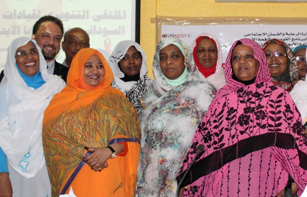
Feature Story
Sudan commits to stepping up its response to HIV
16 December 2012
16 December 2012 16 December 2012
From left to right: Ms. Mahasen Abdelarman, wife of the governor of River Nile State; Dr Hamidreza Setayesh, UNAIDS Country Coordinator; H.E. Mdm Widad Babiker, Wife of the President of Sudan, and other wives of governors and civil society members of “Sudanese Coalition of Women and AIDS”, December 2012, Atbarah, River Nile.
Despite years of conflict and humanitarian emergencies, Sudan is stepping up its response to HIV. Across Sudan there are an estimated 69 000 people living with HIV and HIV prevalence is at 0.4%. Estimates also show that only 10% of the estimated number of people in need of antiretroviral treatment are receiving it.
Sudan has one of the largest populations of people living with HIV in Middle-East and North Africa, and the country is moving forwards in addressing some of the obstacles which have been preventing scale up of HIV prevention, treatment and care. Today, more than 150 centers are providing testing and counselling, and 32 treatment sites have been established around the country to make access to antiretroviral treatment more widely available.
At a meeting organized by the Sudanese Coalition on Women and AIDS* in Atbarah, River Nile State, government officials together with the Sudanese Coalition of Women and AIDS reaffirmed their commitment to providing a comprehensive response to HIV.
Her Excellency Widad Babiker, the wife of the President of Sudan, addressed participants and called for stronger partnerships to prevent new HIV infections. She said “In addition to federal and local governments, responsibility for HIV prevention remains with each of us. We shall commit to a generation free of stigma and discrimination and free from HIV. One of the ways to do that is to expand HIV testing for pregnant women.”
Participants discussed and learnt about the response to HIV in their country and throughout the Arab world. They debated human rights issues, particularly for women and girls in the context of HIV and learnt that the Middle-East and North Africa region has one of the fastest growing HIV epidemics in the world, meaning that prevention interventions in the region have not been sufficient to stop the spread of the epidemic.
We shall commit to a generation free of stigma and discrimination and free from HIV. One of the ways to do that is to expand HIV testing for pregnant women.
Her Excellency Widad Babiker, wife of the President of Sudan
Participants agreed that all sectors of the country will need to contribute to the development of an effective AIDS response that is evidence-based and anchored in the respect for human rights. During the meeting they put together a work plan for each constituency which includes supporting women living with HIV, leading stigma reduction campaigns, mobilizing charities and championing the “show your love, take the test” campaign which is designed to scale up efforts to stop new HIV infections in children.
The Sudanese government demonstrated firm commitment. At a press conference attended by three federal Ministers on the occasion of World AIDS Day, His Excellency Dr Ahmed Bilal, the Federal Minister of Culture and Communication and spokesperson of the Sudanese government said, “HIV is a reality in Sudan and cannot be effectively addressed if we continue to put our heads in the sand.”
His Excellency Dr Amira El-Fadil, Minister of Welfare and Social Security called for a building of sustainable partnerships with civil society, youth organizations and the media as well as the imams and religious leaders to reach all sectors of the population. Dr Bahar Idris, Federal Minister of Health added that reducing new HIV infections will need a significant multi-sectorial effort, “We cannot continue to live in denial and attribute AIDS to neighboring countries,” he said.
UNAIDS Country Coordinator, Dr Hamidreza Setayesh, commended the country’s political commitment to the AIDS response. He also stressed the need for a rapid and significant scale up in the coverage of HIV-related services as well as an increase in domestic resources for AIDS in Sudan. “It is unfortunate and unacceptable to see that 9 out of 10 people in need of antiretroviral treatment in Sudan are deprived of these life-saving measures,” said Dr Setayesh. “With the strong commitment demonstrated by the government and the leadership of Her Excellency Madam Widad, Sudan can show to the region and the Islamic world that universal access is achievable.”
*The Sudanese Coalition on Women and AIDS consists of wives of state governors, women living with HIV, Sudan AIDS Network member associations and local and federal authorities.



